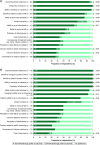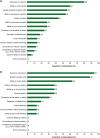Treatment preference and quality of life impact: ravulizumab vs eculizumab for atypical hemolytic uremic syndrome
- PMID: 37515502
- PMCID: PMC10690411
- DOI: 10.57264/cer-2023-0036
Treatment preference and quality of life impact: ravulizumab vs eculizumab for atypical hemolytic uremic syndrome
Abstract
Aim: Ravulizumab and eculizumab are complement C5 inhibitors approved for the treatment of atypical hemolytic uremic syndrome (aHUS). Ravulizumab requires less frequent infusions than eculizumab, which may reduce treatment burden. This study investigated patients' treatment preferences and the impact of both treatments on patient and caregiver quality of life. Materials & methods: Two surveys were conducted (one for adult patients with aHUS and one for caregivers of pediatric patients with aHUS) to quantitatively assess treatment preference and the patient- and caregiver-reported impact of ravulizumab and eculizumab on quality of life. Patients were required to have a diagnosis of aHUS, to be currently receiving treatment with ravulizumab and to have received prior treatment with eculizumab. Participants were recruited via various sources: the Alexion OneSource™ patient support program, the Rare Patient Voice recruitment agency, the aHUS Foundation and directly via a clinician involved in the study. Results: In total, 50 adult patients (mean age: 46.5 years) and 16 caregivers of pediatric patients (mean age: 10.1 years) completed the surveys. Most adult patients (94.0%) and all caregivers reported an overall preference for ravulizumab over eculizumab; infusion frequency was one of the main factors for patients when selecting their preferred treatment. Fewer patients reported disruption to daily life and the ability to go to work/school due to ravulizumab infusion frequency (4.0% and 5.7%, respectively) than eculizumab infusion frequency (72.0% and 60.0%), with similar results for caregivers. Conclusion: Adult patients and caregivers of pediatric patients indicated an overall preference for ravulizumab than eculizumab for the treatment of aHUS, driven primarily by infusion frequency. This study contributes to the emerging real-world evidence on the treatment impact and preference in patients with aHUS.
Keywords: aHUS; atypical hemolytic uremic syndrome; caregiver preference; eculizumab; patient preference; patient-reported outcomes; quality of life; ravulizumab; treatment preference.
Figures




References
-
- Goodship TH, Cook HT, Fakhouri F et al. Atypical hemolytic uremic syndrome and C3 glomerulopathy: conclusions from a “Kidney Disease: Improving Global Outcomes” (KDIGO) Controversies Conference. Kidney Int. 91, 539–551 (2017). - PubMed
-
- Fakhouri F, Zuber J, Fremeaux-Bacchi V, Loirat C. Hemolytic uremic syndrome. Lancet 390, 681–696 (2017). - PubMed
-
- Raina R, Krishnappa V, Blaha T et al. Atypical hemolytic-uremic syndrome: an update on pathophysiology, diagnosis, and treatment. Ther. Apher. Dial. 23, 4–21 (2019). - PubMed
-
- Greenbaum LA, Fila M, Ardissino G et al. Eculizumab is a safe and effective treatment in pediatric patients with atypical hemolytic uremic syndrome. Kidney Int. 89, 701–711 (2016). - PubMed
-
• Evidence from this phase 2 study supports the safety and efficacy of eculizumab in pediatric patients with atypical hemolytic uremic syndrome (aHUS).
Publication types
MeSH terms
Substances
LinkOut - more resources
Full Text Sources
Miscellaneous
